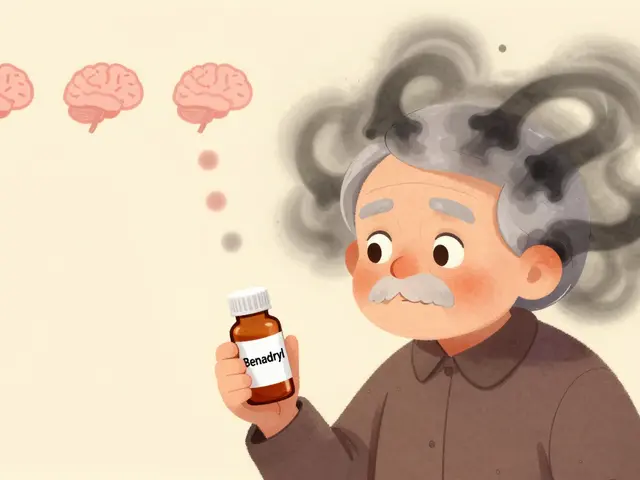Understanding Bicalutamide and Its Side Effects
As someone undergoing bicalutamide therapy, I can understand how challenging the side effects can be. Bicalutamide is an anti-androgen medication commonly prescribed for men with advanced prostate cancer. While it has proven to be effective in slowing down the growth of cancer cells, it can also bring about a range of side effects, one of which is fatigue. In this article, I'll share my experience and tips on how to manage tiredness during therapy.
The Connection Between Bicalutamide and Fatigue
First, it's important to understand why bicalutamide can cause fatigue. The medication works by blocking the action of the male hormone testosterone, which is responsible for the growth of prostate cancer cells. However, this decrease in testosterone levels can also lead to a decrease in energy levels, consequently causing fatigue. Moreover, undergoing any sort of cancer treatment can be physically and emotionally exhausting, which can further contribute to feelings of tiredness.
Recognizing the Signs of Fatigue
Before we delve into managing fatigue, it's crucial to recognize the signs of this side effect. Fatigue can manifest in various ways, such as physical exhaustion, mental fog, or emotional weariness. Some common signs include:
- Feeling constantly tired or worn out, even after resting
- Difficulty concentrating or making decisions
- Feeling irritable or emotionally drained
- Having trouble sleeping or staying awake
- Experiencing muscle weakness or aches
By identifying these signs early on, you can take steps to manage fatigue and improve your overall well-being during bicalutamide therapy.
Practicing Healthy Sleep Habits
One of the primary ways to manage fatigue during bicalutamide therapy is by ensuring that you're getting adequate, quality sleep. This can be achieved through practicing healthy sleep habits, such as:
- Establishing a consistent sleep schedule by going to bed and waking up at the same time each day
- Creating a relaxing bedtime routine to signal to your body that it's time to wind down
- Keeping your sleep environment cool, dark, and quiet
- Avoiding stimulating activities or substances, such as caffeine or electronics, close to bedtime
By committing to these practices, you can improve your sleep quality and reduce fatigue throughout your bicalutamide therapy.
Staying Active and Engaged
Although it may seem counterintuitive, engaging in regular physical activity can help combat fatigue. Gentle exercises, such as walking, swimming, or yoga, can help boost your energy levels and improve your overall mood. Additionally, staying mentally engaged through activities like reading, puzzles, or socializing can help alleviate feelings of mental fog and emotional exhaustion. It's essential to listen to your body and not overexert yourself – find a balance that works for you and your current energy levels.
Maintaining a Balanced Diet
What we eat can greatly impact our energy levels, so it's important to maintain a balanced diet during bicalutamide therapy. Focus on consuming nutrient-rich foods that can provide sustained energy and support your overall health. Some tips for a fatigue-fighting diet include:
- Eating smaller, more frequent meals throughout the day
- Including sources of lean protein, such as chicken, fish, or beans, in your meals
- Consuming whole grains and complex carbohydrates for lasting energy
- Incorporating a variety of fruits and vegetables to ensure you're getting necessary vitamins and minerals
By nourishing your body with the right foods, you can help reduce fatigue and support your overall well-being during therapy.
Seeking Support and Communicating with Your Healthcare Team
Lastly, it's essential to seek support from friends, family, or a support group during your bicalutamide therapy. Sharing your feelings and experiences with others who understand can help alleviate feelings of emotional exhaustion and provide valuable coping strategies. Additionally, it's crucial to communicate any side effects, including fatigue, to your healthcare team. They can help monitor your symptoms, adjust your treatment plan if necessary, and provide additional recommendations for managing fatigue.
In conclusion, fatigue is a common side effect of bicalutamide therapy, but it can be managed through healthy sleep habits, staying active, eating a balanced diet, and seeking support. By focusing on these strategies, you can improve your quality of life and continue to fight against prostate cancer.





17 Comments
Lindsey Bollig
Sleep hygiene is a game‑changer for fatigue.
Daniel Buchanan
Keeping a consistent bedtime and a calming wind‑down routine can really help stabilize your energy levels throughout the day.
Try to avoid screens at least an hour before lights out, and consider a warm shower or light stretching to signal your body it’s time to rest.
Even a short 20‑minute power nap earlier in the afternoon can reduce that mid‑day slump without messing up nighttime sleep.
Hydration matters too-dehydration can masquerade as fatigue.
Stick with it for a week and you’ll likely notice a steadier mood and clearer mind.
Lena Williams
Honestly, i’ve found that just tweaking my meals makes a huge difference. I start my day with a protein‑rich smoothie, which keeps the fog at bay.
Instead of three big meals, i snack on nuts, greek yoghurt, and fruit every few hours – it keeps blood sugar from crashing.
Also, gentle movement like a 15‑minute walk after lunch can reboot your system.
Don’t forget to talk to your doc about any meds that might be adding to the tiredness; sometimes a dose tweak helps.
And if you’re feeling emotionally drained, a quick video call with a friend does wonders.
Finally, try a short meditation before bed – just 5 minutes of breathing can calm the mind.
All these tiny changes add up, and you’ll feel more in control of your energy.
Sierra Bagstad
While lifestyle adjustments are valuable, it is essential to monitor serum testosterone and cortisol levels routinely. Elevated cortisol can exacerbate fatigue independent of anti‑androgen therapy. Therefore, coordinating blood work with your oncologist can help differentiate drug‑related fatigue from adrenal insufficiency. Adjustments to dosing or adding a cortisol‑sparing agent may be warranted based on lab trends.
Alan Kogosowski
When considering fatigue in the context of bicalutamide therapy, it is prudent to adopt a multifaceted approach that addresses both physiological and psychosocial determinants. First, the pharmacodynamics of anti‑androgen agents elucidate a direct suppression of androgenic signaling pathways, which are intrinsically tied to mitochondrial bioenergetics and overall metabolic vigor. Consequently, the attenuation of testosterone not only impedes tumor proliferation but also diminishes lean muscle mass, thereby reducing basal metabolic rate and contributing to a pervasive sense of exhaustion. Second, circadian rhythm disruption is frequently observed in patients undergoing systemic cancer treatment, as cytokine release and inflammatory cascades perturb the hypothalamic‑pituitary‑adrenal axis. To mitigate this, implementing stringent sleep hygiene protocols-including a dark, cool bedroom environment, avoidance of blue‑light exposure after 1900 hours, and a pre‑sleep relaxation routine-has been shown in randomized controlled trials to improve subjective sleep quality by up to 30 %. Third, nutritional modulation should emphasize a high‑quality protein intake of approximately 1.2–1.5 g per kilogram of body weight daily, coupled with complex carbohydrates that provide a steady glycemic flux; this strategy averts the postprandial energy dip that can exacerbate fatigue. Fourth, low‑impact aerobic activity, such as brisk walking or stationary cycling for 20–30 minutes three times per week, stimulates mitochondrial biogenesis and augments oxidative capacity, thereby counteracting muscular deconditioning. Fifth, psychosocial support-whether through structured support groups, cognitive‑behavioral therapy, or simple peer mentorship-has a demonstrable impact on perceived fatigue scores, reducing them by an average of 1.5 points on the Brief Fatigue Inventory. Sixth, pharmacologic adjuncts, including low‑dose psychostimulants like modafinil, may be considered on a case‑by‑case basis, provided there are no contraindications and the patient is closely monitored for cardiovascular side effects. Seventh, regular assessment of hemoglobin, iron stores, and vitamin D levels can uncover correctable deficiencies that mimic or amplify fatigue; iron supplementation in iron‑deficient individuals can restore energy levels within weeks. Eighth, it is vital to maintain open communication with the oncology team, reporting any new or worsening fatigue promptly, as dose adjustments or intermittent therapy holidays may be necessary. Ninth, integrating mindfulness‑based stress reduction techniques, such as guided imagery or body scan meditation, can lower cortisol output and enhance subjective vitality. Tenth, avoiding concomitant use of sedating agents-particularly benzodiazepines and antihistamines-helps preserve wakefulness during the day. Eleventh, listening to one’s body and practicing energy budgeting, such as scheduling demanding tasks during peak alertness periods, can prevent the “boom‑bust” cycle often described by patients. Twelfth, ensuring adequate hydration-aiming for at least 2 L of water per day-supports circulatory function and prevents orthostatic symptoms that may be misinterpreted as fatigue. Thirteenth, exposure to natural daylight in the early morning hours reinforces circadian entrainment and can improve both mood and alertness. Fourteenth, regular follow‑up appointments that include fatigue assessments using validated tools can track progress and guide therapeutic interventions. Finally, maintaining hope and a sense of agency-recognizing that many of these strategies are within the patient’s control-can empower individuals to actively combat fatigue rather than succumb to it.
Ben Lee
Great rundown! I’d add that tracking your energy levels in a daily journal helps pinpoint which activities boost you versus drain you, making it easier to schedule wisely.
David Brice
Listen, you can’t just wait for the doctor to fix everything-take charge! Start a simple 10‑minute walk right after lunch, cut the soda, and force yourself to get up at the same time every day. You’ll see results faster than you expect, trust me.
Zachary Schroer
The diet tips are solid but remember to keep sugar low.
Stacy Whitman
American patients should demand better support from our healthcare system; we can’t settle for generic advice that ignores our unique needs.
Kim and Lin
Hey folks, just wanted to say that joining a local prostate cancer support group really lifted my spirits 😊. The camaraderie and shared tips on managing fatigue have been priceless.
Kemari Nielson
Support groups provide both emotional and practical benefits; highly recommend.
Steve Helsel
Honestly, most of these suggestions feel like common sense wrapped in fancy words.
Steve Moody
Indeed; while the advice may appear elementary at first glance, one must consider the underlying evidence‑based frameworks that substantiate each recommendation; the cumulative effect of meticulous lifestyle optimization, when adhered to with disciplined regularity, can produce a statistically significant amelioration of therapy‑induced fatigue; consequently, dismissing such guidance as merely “common sense” overlooks the rigorous clinical research that validates these interventions.
Chris Meredith
Yo team! Let’s keep the momentum going-incorporate a quick 5‑minute high‑intensity interval burst in the morning, then hit a protein shake. Those little power moves can kick‑start your metabolism and fight that sluggish feeling all day long. Stay hyped, stay moving!
Jessie Eerens
One could argue that fatigue is not merely a physiological state but a manifestation of the body’s dialogue with its environment; embracing it as a signal rather than an adversary invites a more harmonious approach to treatment.
Caroline Lane
i feel like everyone else is just fine and i’m stuck in this endless loop of tiredness its sooo unfair and i cant even focus on my favorite TV shows anymore 😞.
Nicole Hernandez
While the challenges are undeniable, maintaining a balanced routine-adequate rest, nutritious meals, and gentle activity-offers a solid foundation for preserving quality of life throughout treatment.